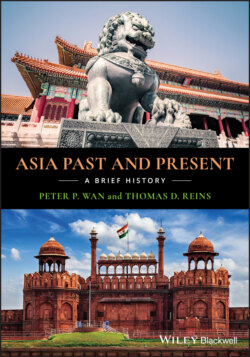Читать книгу Asia Past and Present - Peter P. Wan - Страница 48
The Sui Dynasty (581–618): Reunification
ОглавлениеEmperor Sui Wendi (Yang Jian, 541–604) founded the Sui Dynasty, and he has the distinction of being the principal unifier of China after four centuries of disunity. He was able to achieve this daunting task because the divide between the Han and non‐Han racial and ethnic groups were blurred after four centuries of mixing and remixing in the “melting pot.” The core population he reigned over was the emerging Han Chinese of today. His multicultural personal background was also of tremendous help to him in dealing with the multicultural reality of his empire. He was Han Chinese by birth, but he once served as a high official in the non‐Han Xianbei court, took a Xianbei name, and married the daughter of a Xianbei aristocratic family for his queen. He resumed his Han Chinese name after he became emperor, and required all Han Chinese to do the same.
He adopted an eclectic state ideology to match the complex situation he faced. He used Confucianism to extol the power of the emperor and strengthen the cohesion of the population; used Legalism to uphold the law and impose harsh penalties on both government officials and commoners who broke it; and promoted Buddhism, which was already deeply rooted in both the North and the South. He introduced reforms to create a highly efficient centralized government bureaucracy, realigning it more closely with the Qin–Han model of imperial rule.
His son emperor Sui Yangdi (Yang Guang, 569–618) was the second and last emperor of the Sui Dynasty. He was a man of great talent and ability, but his own arrogance, vanity, and recklessness combined to undermine his rule. In addition, his Sui government faced a major economic challenge—a challenge, however, that resulted in the creation of one of China’s greatest accomplishments. The country’s economic center had been shifting from the Yellow River to the Lower Yangtze River during the preceding Period of Disunity. This created a disconnect between demand and supply: The emperor needed an unending supply of taxes, food, and manpower in the North, where he had his national government and major garrisons, but the sources of most of those supplies resided in central and southern China. Founding emperor Sui Wendi launched the colossal project of building the Grand Canal to connect the north and the south, and his son Sui Yangdi completed it. Eventually, the Grand Canal would be extended to link China’s two major river systems (the Yellow and Yangtze Rivers) and China’s four major cities (Luoyang, Yangzhou, Hangzhou, and Dadu/modern Beijing).
Map of the Grand Canal.
Sui Yangdi had many other important accomplishments. He supervised the design and construction of the new capital city of Luoyang to replace Chang’an. He took a personal interest in education, and the royal library in Luoyang was the largest in Chinese history. He constructed a national network of royal highways, expanded China’s territories, went on a half‐year inspection tour to the northwestern frontiers to enhance the prestige of his empire, and reopened the Silk Road for trade.
But his extraordinary achievements came at a price. He had ascended to the throne by stealing the title of “crown prince” from his older brother, and then killing his father. He turned his father’s practical canal project into an extravaganza to flaunt his wealth and power. He launched three unnecessary and unsuccessful wars against Goguryeo (an ancient state on the Korean Peninsula). To sustain his wars and construction projects, he had to increase taxes and draft millions upon millions of peasants to serve as soldiers and laborers. To further add to the burden of the people, he lived a lifestyle of extreme extravagance, built elaborate palaces, and traveled in extraordinary grandeur. Quite naturally, the burden he placed on the backs of the peasantry generated peasant revolts and rebellions.
He was so full of himself that he would execute high officials and their entire families for speaking disparagingly of him. His despotic behavior caused widespread fear and hatred. Eventually, the commander of his palace guard captured and strangled him to death in a mutiny.
